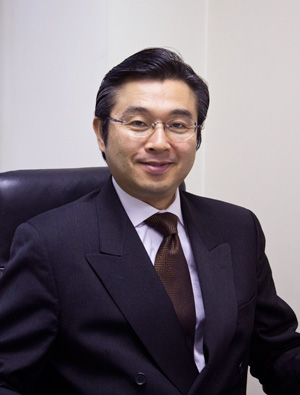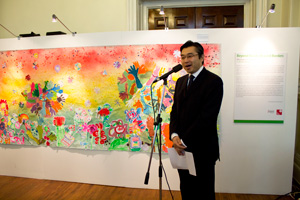| |
Spotlight on: Minister Hiroshi Suzuki
Director, Japan Information and Cultural Centre |
|
This month we feature an interview with Minister Hiroshi Suzuki, who recently arrived in London to take up his new role of Director of the Japan Information and Cultural Centre. A summary of our interview with him follows:
Initial remarks
I would like to extend my very warm greetings to you. I arrived in London towards the end of August, having been transferred from Seoul, Republic of Korea. London is my sixth posting, after Boston, Washington DC, Rome, Tehran and Seoul. In the UK I look forward to meeting and working with as many people as possible who are involved in Japan-UK relations in order to enhance our ties and raise the profile of Japan here.
First of all, I would like to thank the British people for their generous support and warm encouragement for the people in Tohoku affected by the earthquake and tsunami. The recovery is on track but, since it was a catastrophe transcending anybody's imagination, more needs to be done.
|

|
I have a couple of friends who are living in Tohoku, and one of them is my university classmate. Right after the earthquake, my friends and I sent him email after email, and a week later he responded, just saying "I'm still alive". Later on he explained to me that he was busy just surviving and trying to get his life and work back in order. He has to keep long hours and, when he comes back home late at night, sometimes he feels his heart may break. And it is at these most trying times that he really appreciates the help from all over the world. This support makes him feel that he's not alone. Indeed, as long as people have hope, they can carry on. They can work hard and make tomorrow a better day, make next month a better month and make next year a much better year. So I thank the British people from my heart for giving hope to the people in Tohoku through their very generous support and warm encouragement.
Which part of Japan are you from and where did you spend your formative years?
I was born in Kyoto City and was raised in Uji City in Kyoto Prefecture, which is famous for green tea. I attended Middle School and Senior High School in Kyoto City, and then moved to Tokyo for university.
Why did you decide to join the Ministry of Foreign Affairs?
When I was 17, the second year in Senior High School, I went to Milwaukee on an exchange programme called the American Field Service, and had a homestay there for one year. This was really an eye-opener for me because I saw a whole new world and made many new friends, and I came to understand the importance of promoting mutual understanding through people-to-people exchange.
After I came back from the US, I had to choose between Natural Science and Social Science in my preparation for my university entrance exam. It was then I came to know that there was such a profession as diplomat, and I vaguely came to aspire to becoming a diplomat one day.
I read Law at the University of Tokyo and, after graduating in 1985, I joined the Japanese Foreign Ministry. So I have now served in the foreign service for more than 25 years.
Tell us about the main stages of your career.
The first year was on-the-job training in Tokyo, and then I was sent to Boston to study English for two years. I went to the Fletcher School of Law and Diplomacy, which is the oldest graduate school on International Relations in the United States. After graduating from the Fletcher School in 1988, I worked in the Japanese Embassy in Washington DC for two years. For the first year I worked in the Management Section in charge of various VIPs' visits to Washington, and for the second year I worked in the Ambassador's Protocol Office. At that time it was the height of Japan-US trade negotiations, and I had long, hard hours. On average I slept three or four hours a day.
I returned to Tokyo in 1990, and for the subsequent 10 years I worked in the Foreign Ministry headquarters, handling four different portfolios. First I was a desk officer for South Asia for two years until 1992, where I was in charge of India and Pakistan. Next I moved on to the political division covering North America from 1992 to 1995. I was Deputy Director and was involved in the management of Japan-US relations from the political perspective.
My third portfolio was the WTO. With the establishment of the WTO in 1995, I became Deputy Director of the WTO division and was thus heavily involved with international trade. Almost every month I had to fly to Geneva, and even while I was in Tokyo I often had to stay up all night to finish up my work.
My fourth job in Tokyo was Principal Deputy Director for the political division covering Western Europe. For two and a half years I was involved in advancing relations between Japan and Western European countries, and also with the EU and NATO.
In summer 1999 I was posted overseas again. My assignment was in Rome, where I served as Political Counsellor for more than two years. In summer 2001 the Genoa G8 Summit was held, where clashes were so severe that a demonstrator got killed for the first time ever in the history of the G8.
Soon afterwards 9/11 happened and I was transferred to Tehran, where I served as Political Counsellor for almost three years. Soon after I arrived in Tehran, I was sent to Kabul, Afghanistan, from February to March 2002 as head of the Liaison Office there, in order to reopen the Japanese Embassy.
In summer 2004 I returned to Tokyo from Iran, and became the Director of a newly-created office where my primary task was to analyse the situation in the Middle East. At that time, Japan's Ground Self-Defence Forces were stationed in Al-Samawa, Iraq, and much of my work was to follow very closely political and security developments in that country.
In summer 2005 I was seconded to the Prime Minister's Office and became Private Secretary to the Chief Cabinet Secretary, or Kanbo-chokan (the No. 2 minister in the Cabinet). I first served Mr Hiroyuki Hosoda for two months and then Mr Shinzo Abe for a year.
When Mr Abe became the Prime Minister in September 2006, I became Deputy Cabinet Secretary for Public Relations, which is essentially the Prime Minister's spokesman for the international press. I served in that capacity for one and a half years - one year under Prime Minister Abe and six months under Prime Minister Fukuda.
I returned to the Foreign Ministry in January 2008 after finishing up my secondment to the Prime Minister's Office, and I became Director for the International Press, serving as the Foreign Ministry spokesman for the international press for one year.
|

|
In January 2009 I was stationed in Seoul, where I served for two and a half years. For the first one year and eight months I was in charge of management, including crisis response, and as such I was always kept on my toes regarding possible provocations by North Korea. In September last year I became the Director of the Japan Information and Cultural Centre in Seoul, where I served for ten months. Although I had a bit of experience in press affairs, this was my first time to be involved in cultural affairs, and I enjoyed meeting so many people involved in cultural exchange between Japan and South Korea. I am glad to be continuing with the same portfolio in London and look forward to meeting many British people who are involved in Japan-UK cultural exchange.
|
What do you hope to achieve during your time in London?
While I am in London I would like to contribute to enhancing Japan-UK relations and raising the profile of Japan in the UK. Our two countries have a long-standing relationship going back more than a hundred and fifty years, and in today's fast-changing, globalising world, we are natural partners in tackling the common challenges the international community faces. We share basic values such as freedom, democracy, the rule of law and human rights. Clearly, cultural and people-to-people exchange underpin this very important bilateral relationship. Next year will be particularly exciting because of the 2012 London Olympic & Paralympic Games, which I am sure will attract many visitors to London. Indeed, I expect that the Games will give a further boost to Japan-UK relations and cultural exchange.
What do you like to do in your spare time?
I arrived in London nine weeks ago and am here by myself. My family unfortunately had to stay back in Tokyo because of my daughter's schooling. As for leisure, I have been busy unpacking, so I haven't had much spare time yet. But when I finish settling into my new home, I hope to find the time for some of my favourite activities such as reading, listening to music and travelling.
I used to do some sports like golf, tennis and skiing, but in spring this year I severed a ligament in my right wrist. I had surgery in April and had my plaster removed in May. My doctor told me that rehabilitation would take approximately one year, so I have to keep away from any sport which might put a strain on my wrist.
My wife has longstanding links with this country. There is a family living in Tisbury, near Salisbury, that she has known for about 30 years. Meanwhile, my daughter is a big fan of Harry Potter. So it is a real pity that they cannot be with me during this assignment. But as soon as the school holidays arrive, whether in winter, spring or summer, my wife and daughter will waste no time in flying to London to spend the holidays with me.
|
|
|
| Top |
|
| |
|
|
|
|
| |
|  |
|

